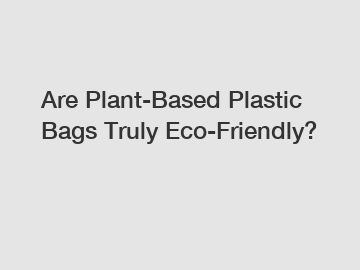Feb. 02, 2024
Chemicals
Are Plant-Based Plastic Bags Truly Eco-Friendly?
In recent years, plant-based plastic bags have been hailed as a more sustainable alternative to traditional plastic bags. These bags, often made from renewable resources such as cornstarch or sugarcane, are marketed as biodegradable and compostable, with claims of being eco-friendly. However, a closer examination reveals that the reality may not be as straightforward as it seems.
The first aspect to consider when assessing the eco-friendliness of plant-based plastic bags is their production process. While it is true that these bags are derived from renewable resources, the cultivation of crops used in their production can still have negative environmental consequences. Large-scale farming can lead to deforestation, soil erosion, and the depletion of natural resources. Additionally, the energy-intensive manufacturing process required to convert plant materials into plastics may contribute to greenhouse gas emissions and pollution. Therefore, the initial stages of production cast some doubt on the environmental benefits of plant-based plastic bags.

Moreover, the biodegradability and compostability of these bags are often exaggerated. While it is true that they can break down under certain conditions, such as in industrial composting facilities, they do not readily decompose in the natural environment or home composting systems. In a landfill, where most plastic waste ends up, plant-based plastic bags may persist for years, just like their traditional counterparts. This limited biodegradability raises questions about their actual impact on reducing plastic pollution.
Furthermore, the widespread adoption of plant-based plastic bags may have unintended consequences. As the demand for feedstocks like corn or sugarcane increases, so does the pressure on agricultural land. This may lead to the conversion of natural habitats into farmland, exacerbating biodiversity loss and threatening fragile ecosystems. Additionally, the competition for resources between food and bag production could drive up food prices, affecting vulnerable populations.
Considering the various factors discussed above, it becomes clear that plant-based plastic bags are not a panacea for the environmental issues associated with traditional plastic bags. Instead, a more comprehensive approach is required to tackle plastic pollution. This includes reducing overall plastic consumption, promoting reusable alternatives, and improving waste management systems.
One promising direction is the development of innovative materials, such as compostable bioplastics derived from non-food sources like algae or agricultural waste. These materials offer the potential for true biodegradability in various environments, reducing the burden on landfills and ecosystems. Additionally, investing in recycling infrastructure and consumer education can significantly contribute to minimizing the environmental impact of plastic waste.
In conclusion, while plant-based plastic bags may seem like a greener option at first glance, their eco-friendliness is questionable when considering the entire lifecycle and potential consequences. It is crucial not to oversimplify the complexity of environmental issues and focus solely on individual solutions. A holistic approach, embracing reduced consumption, improved recycling, and the exploration of alternative materials, is necessary to achieve genuine sustainability and mitigate the harmful effects of plastic waste.
Contact us to discuss your requirements of is resin compostable, biodegradable resin manufacturers, corn starch resin. Our experienced sales team can help you identify the options that best suit your needs.
Previous: Unveiling Xinnuo Lixing: Top International Trade Products solving all your queries!
Next: The Dos and Don'ts of Working with Silicone Adhesives and Sealants
If you are interested in sending in a Guest Blogger Submission,welcome to write for us!
All Comments ( 0 )